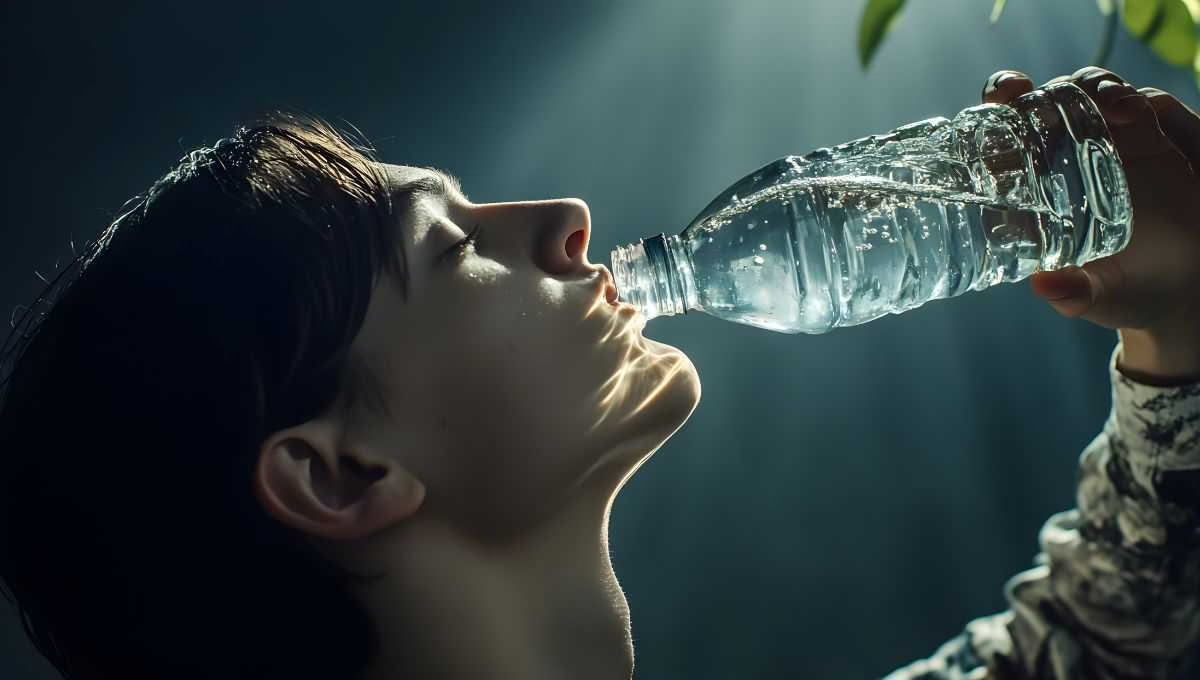One of the most basic elements of life on earth is water — a liquid without which life is unimaginable. About 60 percent of the human body is made up of this water, which maintains everything from blood circulation to brain function to skin moisture. But the big question is, how much water should we drink every day?
Many people say, “We should drink 8 glasses of water every day.” But in fact, this popular rule does not apply equally to everyone. A person’s water needs depend on age, body weight, climate, diet, and even the type of work or amount of exercise.
Women vs. Men’s Water Needs

According to research, an adult woman needs to drink approximately 11 cups (2.7 liters) of water per day, while men need about 15 cups (3.7 liters) of water. Approximately 20 percent of this water comes from food, including water-rich items such as fruits, vegetables, and soups.
However, this amount is not fixed. Those who exercise regularly or live in hot places lose more water from their bodies through sweat, so they need to increase their water intake.
Role of Water in the Body
Water is essential for every organ and cell in the human body to function properly. Below are some important roles—
- Blood Circulation: A large part of blood is water, which delivers oxygen and nutrients to every part of the body.
- Temperature Control: Sweat is produced to keep the body cool in the heat, and the main component of sweat is water.
- Aid in Digestion: Water is very important in breaking down food and absorbing nutrients.
- Joint Lubrication: Water acts as a fluid in the joints, so that there is no friction between the bones.
- Toxin Removal: Water helps to remove toxins from the body through urination.
- Keeping the Skin Moist: Drinking water regularly keeps the skin soft, bright, and healthy.
Symptoms of Dehydration
When the body does not get the required amount of water, dehydration occurs. Some common symptoms are—
- Excessive thirst
- Dry face and skin
- Headache or dizziness
- Dark urine
- Fatigue and decreased concentration
Minor dehydration can be easily compensated by drinking water, but prolonged dehydration can damage the functioning of the kidneys, heart, and brain.
Read more :- 10 Benefits of Butterfly Pea Flower Tea – The Magic of Blue Tea
Daily Water Intake Formula
Although everyone’s water needs are different, following some simple formulas makes it easier to drink the right amount of water.
- Weight-based calculation: 30–35 ml of water is needed per kilogram of body weight per day.
- Example: About 1.8–2.1 liters of water is sufficient for a person weighing 60 kg per day.
- Understand by looking at the color: If the urine is light yellow or almost clear, you will know that the body is getting enough water.
- Before and after meals: Drinking water 30 minutes before and after meals helps digestion.
- A glass after waking up in the morning: After a night’s sleep, the body is dry, so a glass of water in the morning is essential.
Water intake through food
We get a lot of water not only from drinks, but also from our food. The following foods have a lot of water content—
- Cucumber (96%)
- Watermelon (92%)
- Lettuce (95%)
- Orange (86%)
- Tomatoes (94%)
- These water-rich foods keep the body hydrated and break the monotony.
What is Water, and its chemical identity?
Water is an inorganic chemical compound, each molecule of which is made up of two hydrogen and one oxygen atom (H₂O). It is the only substance on earth that exists in three states at the same time—solid (ice), liquid (water), and vapor (water vapor).
Water is spread everywhere on Earth—it exists as water vapor in rivers, lakes, oceans, groundwater, and even in the atmosphere. In cold regions, water is found as snow, glaciers, or ice sheets.
Importance of Water in Life
Water is essential for the survival of life. It is not only a function of the body, but is also deeply involved in our daily lives—
- Food production: Agriculture requires a lot of water to grow crops.
- Household use: Drinking, cooking, bathing, cleaning—the basic ingredient of everything is water.
- Industry and factories: Water is used to produce products, cool machines, and purify them.
Why is it important to protect pure water?
Pure drinking water is one of the most important resources on earth today. But this water is increasingly polluted due to human activities, industrial waste, chemicals used in agriculture, and municipal waste.
This pollution is not only a threat to humans, but also to the entire ecosystem. Drinking contaminated water can cause complications such as digestive problems, liver or kidney disease.
Therefore, water purification, reuse, and conservation—these three issues are now the need of the hour.
Climate Change and Water Crisis
The threat of a global water crisis is increasing due to climate change. On the one hand, floods are caused by heavy rains, and on the other hand, rivers and lakes are drying up due to drought.
The rate of snowmelt is increasing, glaciers are shrinking, and many regions may face water shortages in the future.
In addition, seawater is not directly usable because it is salty. Therefore, reliance on water conservation and desalination technology is increasing.
The Future of Water Purification
Previously, conventional water treatment plants used screening, filtration, and disinfection methods. Now the technology has improved further.
In the future, water purification will use:
- Reverse Osmosis (RO)
- Nanofiltration
- Ultrafiltration
- UV oxidation
- Electrodialysis
- Membrane distillation
- These modern technologies are expected to revolutionize the supply of safe water worldwide.
Ways to Save Water
Only 3 percent of the world’s total water is fresh water; the rest is salty. Therefore, it is everyone’s responsibility to save water.
Below are some simple ways—
- Do not brush your teeth with the tap open.
- Collect rainwater (Rainwater harvesting).
- Use drip irrigation or water-saving farming methods.
- Fix leaks in the pipelines at home.
- Make arrangements for water recycling after use.
Brain and Water
The human brain is made up of about 73% water. Therefore, adequate water is essential to maintain brain function.
Studies have shown that even slight dehydration reduces attention, increases headaches, and increases stress.
Drinking water regularly throughout the day improves mental alertness, focus, and memory.
Relationship between water and the heart
Drinking enough water improves blood circulation and reduces stress on the heart. If there is not enough water in the body, the blood thickens, causing the heart to work harder.
On the other hand, adequate water controls blood pressure and reduces the risk of a heart attack.
When should you drink more water?
Drinking water at certain times is most beneficial for the body—
- After waking up
- Before and after exercise
- Before going out in hot weather
- After eating salty or spicy foods
- When you are sick or have a fever
Drinking too much water — can it be dangerous?
Just as water deficiency is harmful, drinking too much water is also risky. Excess water can reduce the body’s sodium levels and cause water intoxication, which can be life-threatening.
Therefore, it is right to drink water as needed, not unnecessarily.
Water is not just a means of quenching thirst; it is the foundation of life. Drinking the right amount of water every day keeps the body fit, the mind calm, and life vibrant.
Include water in your routine today—start your day with a glass of water in the morning, drink small amounts repeatedly throughout the day, and take another sip before going to bed at night.

Hi readers. I’m Piyali Batabyal, a passionate blogger who loves to share her thoughts, ideas, and experiences across a variety of topics—from lifestyle and beauty to personal growth and creativity. With a curious mind and a love for words.
Alongside my writing, I am also a professional makeup artist with a flair for enhancing natural beauty and creating transformative looks.

